Imagine you’re walking down an ancient, stone road…
In the distance, you hear music and the voices of people gathering and singing songs. You join the crowd along the road and slowly walk up a very tall hill. At the top of the hill is a magnificent white building supported by gigantic marble pillars. People are streaming into the building as they clap their hands, sing and celebrate. Inside the temple, you gaze up at an enormous statue of Athena, the Greek god who protects your city. You place a wreath of flowers and food at her feet as an offering. Others around you do the same. Today is Panathenia, the festival celebrating Athena’s birthday. It’s the most important holiday of the year in the city of Athens.
Athens and Sparta
Tonight we’re going to learn about Athens and Sparta, two of the earliest civilizations in Western History. Athens and Sparta were located in what is now known as Greece in Europe on the Mediterranean Sea.
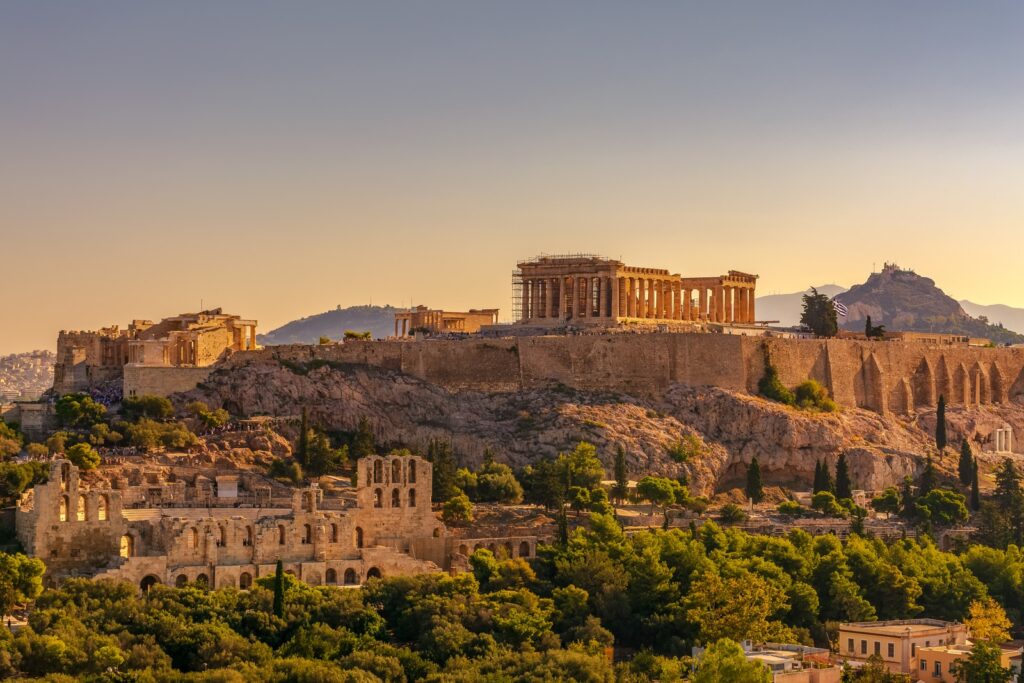
Around 2,500 years ago Greece had over 1,000 city-states. A city-state was like a very small country. Athens and Sparta were two of the most powerful. At the time the Persian Empire controlled Greece and many of the city-states. But the Greek city-states wanted to be free of Persian rule, so they went to war and eventually beat the Persians during the Battle of Marathon. After the Greco-Persian War Athens and Sparta grew in number of people and in wealth.
Watch the video
Listen to the audio
Athens
Even though they lived nearby each other, the people of Athens and Sparta couldn’t be more different. The people of Athens were known for their love of wisdom and subjects such as philosophy, history, science, and art. The word philosophy is a Greek word that means “love of wisdom.” The earliest and most famous philosophers like Socrates, Plato, and Aristotle were Greek. They spent their days studying the world around them and reflecting on their own thoughts. One of Socrates’s most famous quotes was an “unexamined life is not worth living,” which means we should focus on trying to understand our own thoughts and motivations and trying to make sense of the world around us. Inscribed on the Temple of Delphi were the words: “know thyself.” As we come to understand our own minds and intentions, we can improve ourselves and likewise the world around us. The philosopher Aristotle was known for studying nature and making observations about it. He was fascinated by the world around him.
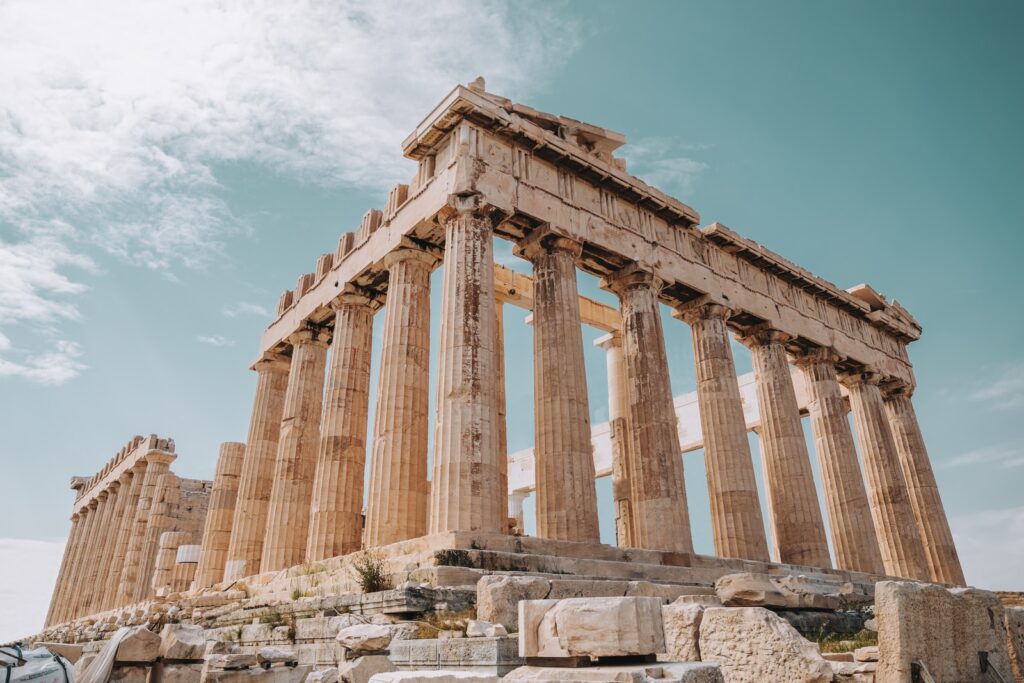
During its Golden Age Athens formed one of the first democratic governments, which means large groups of people made decisions for their city-state rather than a single ruler. This style of government was ahead of its time and later influenced the democratic governments we enjoy today, ruled by the people instead of a king. One of their leaders was named Pericles. Pericles was a talented speaker who loved wisdom and was known for thinking rationally, which means making decisions based on truth rather than strong emotions. The people loved Pericles and he led them to make good decisions for Athens. Most children were able to attend school and taxes were used to make the city a better place. The Athenians built beautiful temples to the Greek gods. The Parthenon was the most famous temple whose ruins can still be seen today on Acropolis Hill. Inside the Parthenon, they built sculptures of the goddess Athena and Zeus, the god of sky and thunder.
Athenian Mythology
The Athenians wrote stories about their gods, which became known as Greek Mythology. Each of the gods had a personality and behaved like humans. Sometimes they were angry, sometimes they were happy, and even threw parties. In the stories, the gods fought wars and often used humans to do the fighting for them. The Athenians used their gods to explain acts of nature like hurricanes and the crash of thunder. The stories often also included moral stories to teach how people should behave. Some of the other well-known gods were Poseidon, the god of the sea, Hera, the goddess of marriage and family, and Ares, the god of war.
The theater was also very popular in Athens. The people loved to gather and watch plays and listen to songs and music. Some of the great playwrights of the time were Sophocles, Euripedes, Aeschylus, and Aristophane.
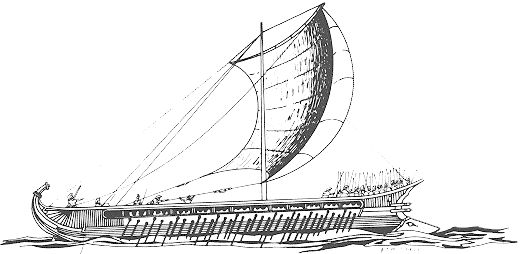
The Athenians loved art and wisdom, but to protect themselves and secure their freedoms, they also built a powerful navy. A navy was important because Greece was located on the Mediterranean Sea and surrounded by islands and other coastal city-states, which often attacked each other. Athen’s navy was made up of triremes, huge wooden warships that carried 170 rowers manning 3 banks of oars. The ships were 100 feet long and 20 feet wide. At one point Athens had over 400 warships and 80,000 sailors that protected their coasts. All young men joined the military when they were 18.
Sparta
Athens wasn’t the only powerful city-state in Greece at the time. Sparta was another very powerful city-state, but they couldn’t be more different than their neighbors. The Spartans were ruled by two kings and a small group of leaders who controlled the people by force. They prized military strength above all else. They were all about being strong and dangerous — a true warrior society. At the age of 7, Spartans joined a military school called the Agoge, which trained them to be tough and fierce. They went everywhere barefoot, so their feet could be strong. They ate bland food and wore uncomfortable clothes to toughen them. They learned how to wrestle and fight as soldiers. They were taught self-control and to be courageous in the face of danger. All Spartans were expected to devote their lives to their city-state above all their personal wants and needs.
Sparta was made up of three groups: the Spartans, who were full citizens and full-time soldiers, the Helots, who were slaves to the Spartans, and the Perioeci (peer-ee-oh-see), skilled craftsmen who built things such as homes and weapons of war.
Spartan soldiers were called hoplites. In battle, they wore bronze helmets, breastplates, and red cloaks. They carried large round shields, and a spear or sword. They were truly fierce warriors and were known for their tight fighting formation called a phalanx. In a phalanx, hoplites stood close together with their shields overlapping to form a single wall of armor. Then they attacked together as one body.
King Leonidas
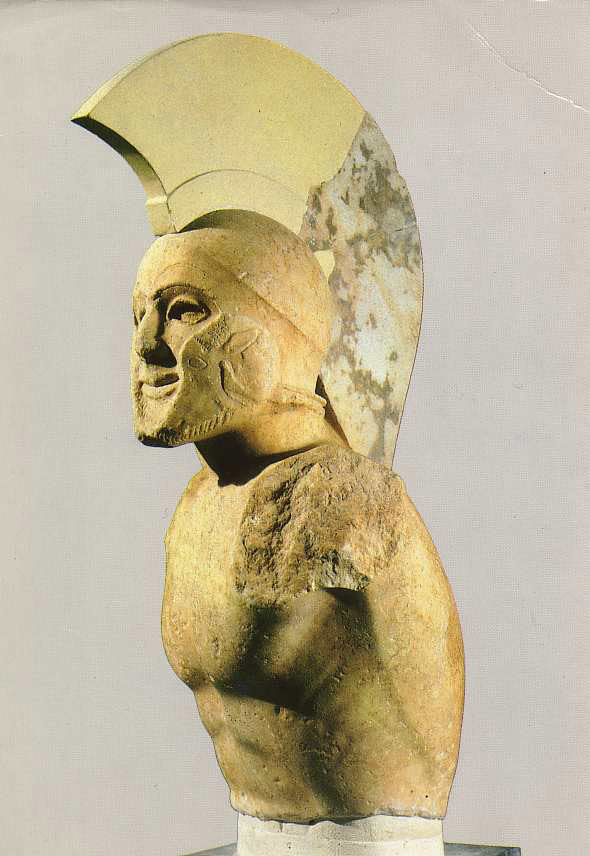
One of the most famous Spartans was King Leonidas, who led his army against the Persians in the Battle of Thermopylae. According to Greek historians, when Leonidas saw they were losing he sent most of his troops home, but stayed with 300 soldiers to fight a much larger army of Persians for three days. Leonidas and the other Spartans fought bravely, but the Persians found a way around them and eventually won. Even though Leonidas and his army lost, they would forever be remembered for their courage to continue fighting even when they were outnumbered.
Spartan women were known for being strong-minded and independent. They were also expected to be fit and physically strong. They received some education and competed in games such as javelin throwing and wrestling. They also enjoyed dancing and singing and were able to own their own property, which wasn’t common in other parts of Greece.
The Peloponnesian War
Sadly, Sparta and Athens didn’t get along. As they grew more powerful, Athens tried to control the other city-states like Sparta, which wouldn’t stand for it. In 431 B.C. Sparta and its allies attacked Athens in what became known as The Peloponnesian War. Athens had a strong navy, but Sparta was stronger on land and besieged Athens. A siege is when one army surrounds the city of its enemy. During the siege a plague also hit Athens and many of its people didn’t survive, making the city even weaker. Surprisingly, Athens survived the siege, but the war went on for another 15 years. Athens tried to use its navy to beat Sparta, but in 405 B.C. the Spartan general Lysander and his armies finally beat Athen’s navy and besieged the city once again. This time they conquered. Athens had to surrender and join the new Spartan Empire.
Eventually, Sparta faced its own problems, like the revolt of its slave class who didn’t want to be ruled anymore. By around 300 B.C. the more powerful empire of Alexander the Great conquered Greece and Sparta, too.
Even though Athens lost the war against Sparta, their ideas about philosophy and history and science, and art spread throughout Greece and beyond. Later the Roman Empire admired Greek thought and culture and its beautiful sculptures were admired through the ages. During the Renaissance, Greek culture was rediscovered by the Italians, and once again the philosophy of Socrates and Plato was read. In fact, you can read their writings today and they have formed the foundation of modern philosophy.
Tonight think about the values of each of these amazing groups of people. Neither was perfect, but you can take what is best about them and apply it to your own life. The Athenians loved the mind and wisdom. What does it mean to you to “know yourself”? Spend some time thinking about your own thoughts and why you do things or maybe why you were upset about something the other day. As you come to know yourself first, you can better manage yourself, and in turn, help those around you.
Also, think about Aristotle and how curious he was about the world around him. He studied every living thing he saw: the sky, the trees, the birds, and other animals. He made observations about them and continued learning and sharing his ideas with others.
The Greeks loved beauty and found ways to express it through their sculptures. You could do the same by drawing beautiful things around you.
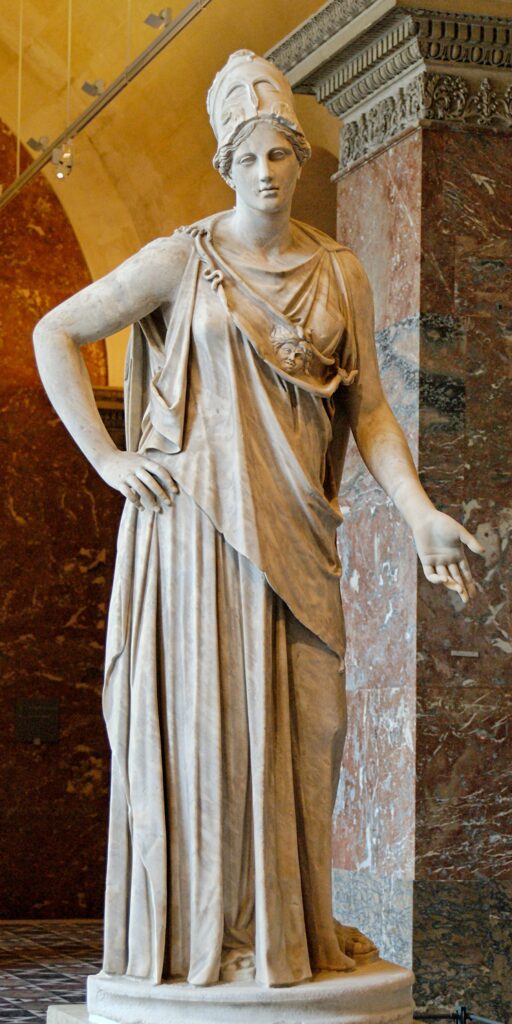
The Spartans were dangerous and aggressive, but we can take their values of courage, and strength and apply them to ourselves. Spartan children didn’t always get what they wanted, this taught them to have self-control. Sometimes when we get everything we want, we don’t appreciate things as much. They also found ways to strengthen their bodies by running and swimming and doing sports. It’s important to keep your own body strong and healthy. Think of ways you can be physically fit like a Spartan.
Spartans also had the courage and continued to fight even when they were outnumbered. The struggles you face may not always be physical, it may just be a problem you’re trying to solve or something you’re trying to be better at, but you can continue trying and persevering even when it seems like you can’t win.
May you have the mind and heart of an Athenian and the strength and courage of a Spartan!
Check out these great books about Ancient Greece!
Watch a tour of the Acropolis in Athens, Greece:
